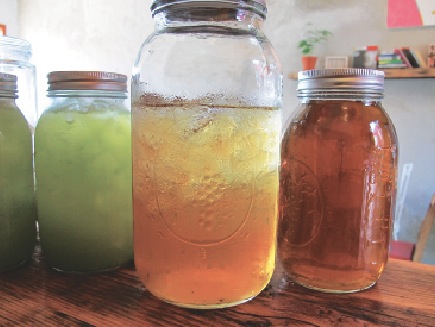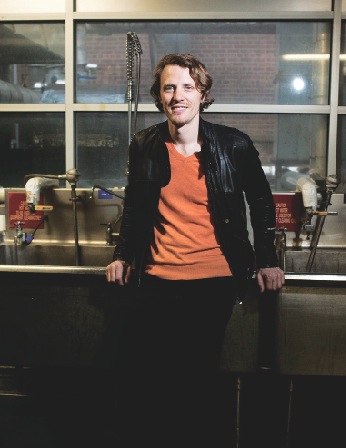
Yuzu Lemonade, Cinnamon Plum, Ginger Bomb, Mint Chocolate Cookie, Honey Bourbon Pu-erh (no honey or bourbon added), Silver Needle Jasmine, and Golden Needle are among the kombucha drink flavors Casper produces. Pictured here, are Peach, Super Green, and Oolong kombucha. Photo courtesy of Brett Casper
If classic Lipton-and-lemon isn’t your cup of tea, maybe it’s time to try kombucha, an effervescent tea-based beverage that bubbles with the satisfying fizz of soda, yet is purported to actually be good for you. Though many are still unfamiliar with the concoction, Williamsburg-based brewer Brett Casper has lately created a local stir with his Kombucha Party™ (kombuchapartynyc.com) libations, all of which are made via a simple—albeit time-intensive—process.
“I first brew fair-trade tea in five-gallon glass jars that look like honey pots,” says Casper. Next, he adds organic sugar and what’s called a starter, or a small portion of already fermented tea. Biology soon takes over. Left unrefrigerated for anywhere from seven days to four weeks, each concoction forms a colony of friendly yeast and bacteria, similar to the kind found in probiotic foods. Such “living” products (like yogurt and miso) are reportedly good for the gut, because they stimulate natural digestive juices and prevent indigestion. “If I get bloated after a heavy meal, I’ll drink kombucha and instantly feel better,” says Casper. “It’s also a great hangover cure!” Others claim it boosts immunity and can even help fight cancer, though all health benefits have yet to be scientifically proven.

Brett Casper stands inside the Pfizer building located in South Williamsburg, which has recently become a booming culinary production facility, and where he plans to lease space for his kombucha tea production. Photo by Benjamin Rosenzweig
Still, devotees continue to down the brew, some simply because they dig the taste. Get past the initial slightly sulfuric aroma that comes from fermentation, and you’ll find that each batch boasts its own distinct palette of flavors, depending on ingredients. Jasmine Pearl, made of green tea leaves and the silvery down-covered buds of jasmine flowers, teases with the tantalizing—and somewhat incongruous—essence of Concord grapes. Mint Chocolate Cookie, a combination of green tea, mint, and fermented cacao beans, can satisfy most sweet tooths, while Ginger Bomb, brewed from fiery ginger root and an aged Chinese tealeaf called pu-erh, will kick you awake on a sleepy summer morning. Choose from 13 different seasonal flavors, each $10 for a 750-mililiter Champagne-style bottle sealed with a punt. Casper reuses his bottles, which are always glass because the acids in kombucha would react badly with metal and plastic containers, leaching harmful by-products into the living brew and altering its taste.
And when it comes to tea—the second most consumed beverage in the world, after water—Casper doesn’t mess around. A lifelong health nut who used to trade lunchroom cookies for carrots, his devotion deepened while living in Tokyo for eight years, where he studied the principles of ancient tea ceremonies. Later, inspired by the teahouses he’d visited while traveling through Hong Kong, Casper opened the eco-friendly Pure Luck Tea Bar on Metropolitan Avenue, selling his bubbly beverage to a diverse clientele, until the café closed in May.
Kombucha Party™ brews are now available for home delivery, or at local eateries like Awakening in Greenpoint and Atlas Café in Williamsburg. Casper also hopes to open a new teashop next spring—and that’s only the beginning. “I’d love to brand my kombucha and see it in restaurants and bars,” says the New Jersey native. “You can go high-end and serve it as a wine substitute with dinner, or stock vending machines with small bottles instead of soda. There’s practically no limit to what one might do with tea.”
Leave a Reply